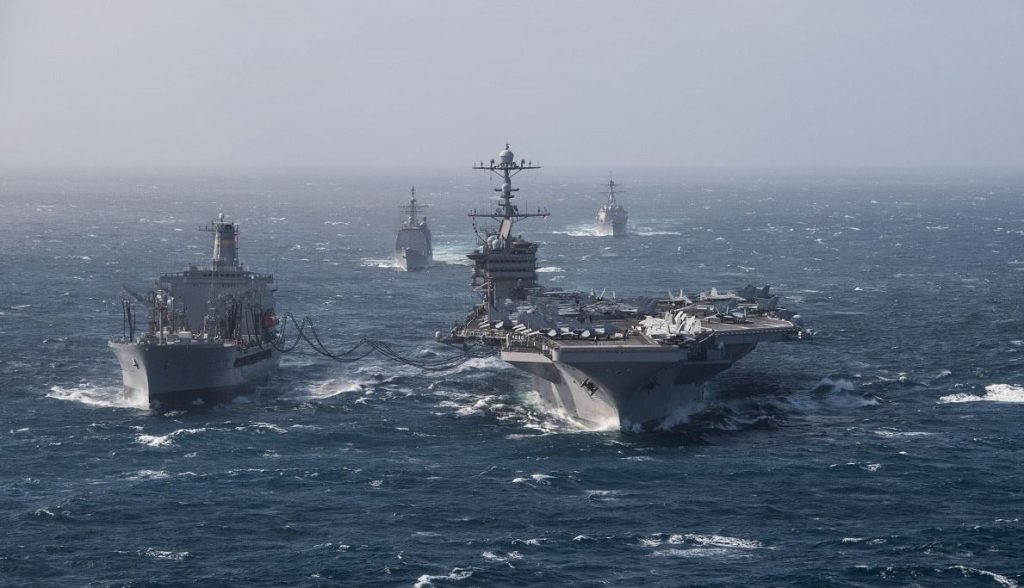
The deployment of a US aircraft carrier to the Persian Gulf is nothing but “psychological warfare”, the commander of Iran’s Revolutionary Guard has insisted, like reported bytheweek.co.uk .
Major General Hossein Salami told Iran’s parliamentarians on Sunday that a US war was impossible, claiming Washington lacked the necessary military strength.
Another senior commander told lawmakers at the closed-door session that Iran had the firepower to “hit the US in the head”, according to The Guardian.
The remarks “represent another ratcheting up of the bellicose rhetoric between Washington and Tehran, since Iran began a partial withdrawal last week from the 2015 nuclear deal”, says the newspaper.
Aircraft carrier USS Abraham Lincoln, carrying up to 40 strike aircraft, has been deployed to the Gulf almost exactly a year after President Donald Trump announced his decision to pull the US from the nuclear accord – which lifted sanctions from Tehran in exchange for Iran agreeing to curb its nuclear programme.
The Trump administration has also reimposed sanctions and worked on a campaign to isolate the country from the international community in recent months.
The moves have triggered the collapse of Iran’s economy, “plunging the country into a deeper and deeper recession, impacting millions of Iranians who were already struggling under the regime’s brutal rule”, says Vox.
The US may just be saber-rattling, but by “cornering Tehran” they have “greatly magnified the danger”, says Colin Kahl, an Iran expert and former adviser to Joe Biden, in an article for Foreign Policy. “The action-reaction spiral the administration set in motion with its maximum pressure campaign has produced a very ominous situation – one in which the risk of military confrontation grows by the day,” Kahl writes.
Indeed, “rather than bringing Iran’s leaders to their knees, America’s belligerence has caused them to stiffen their spines”, says The Economist. Even President Hassan Rouhani, who “championed the nuclear deal, has begun to sound like a hawk”, the magazine adds.
Iran has given the EU 60 days to come up with fresh measures to dilute the impact of US sanctions, warning that otherwise the Middle Eastern nation will take fresh steps to leave the agreement, including increasing levels of uranium enrichment. All this “suggests that Iran will start moving closer to being able to build a nuclear bomb”, says The Economist.
Most experts point the finger of blame for the escalation at John Bolton, Trump’s national security adviser. Bolton “has had it in for Iran for decades”, says The Spectator’s Jacob Heilbrunn.
In 2015, Bolton wrote an article in The New York Times demanding that America bomb Iran.
“The inescapable conclusion is that Iran will not negotiate away its nuclear programme. The inconvenient truth is that only military action like Israel’s 1981 attack on Saddam Hussein’s Osirak reactor in Iraq or its 2007 destruction of a Syrian reactor, designed and built by North Korea, can accomplish what is required. Time is terribly short, but a strike can still succeed,” he wrote.
Iran’s foreign minister, Mohammad Javad Zarif, pointed out in a tweet this weekend that in another article, in 2017 for the National Review, Bolton laid out plans for the US to withdraw from the nuclear deal and take a more aggressive posture toward the Islamic Republic.
But “bombing would not destroy Iranian nuclear know-how, [rather] it would drive the programme underground, making it impossible to monitor and thus all the more dangerous”, says The Economist. “The only permanent solution is renewed negotiation,” the magazine argues.
Unfortunately, “none of the theoretical exits from this emerging crisis seem particularly likely”, Eric Brewer, who worked in Trump’s National Security Council, told Vox.
“Countries and companies are not going to be willing to risk US sanctions to provide Iran with the type and scale of economic benefits it’s clearly looking for. Nor is the US likely to soften its demands,” Brewer warns.


